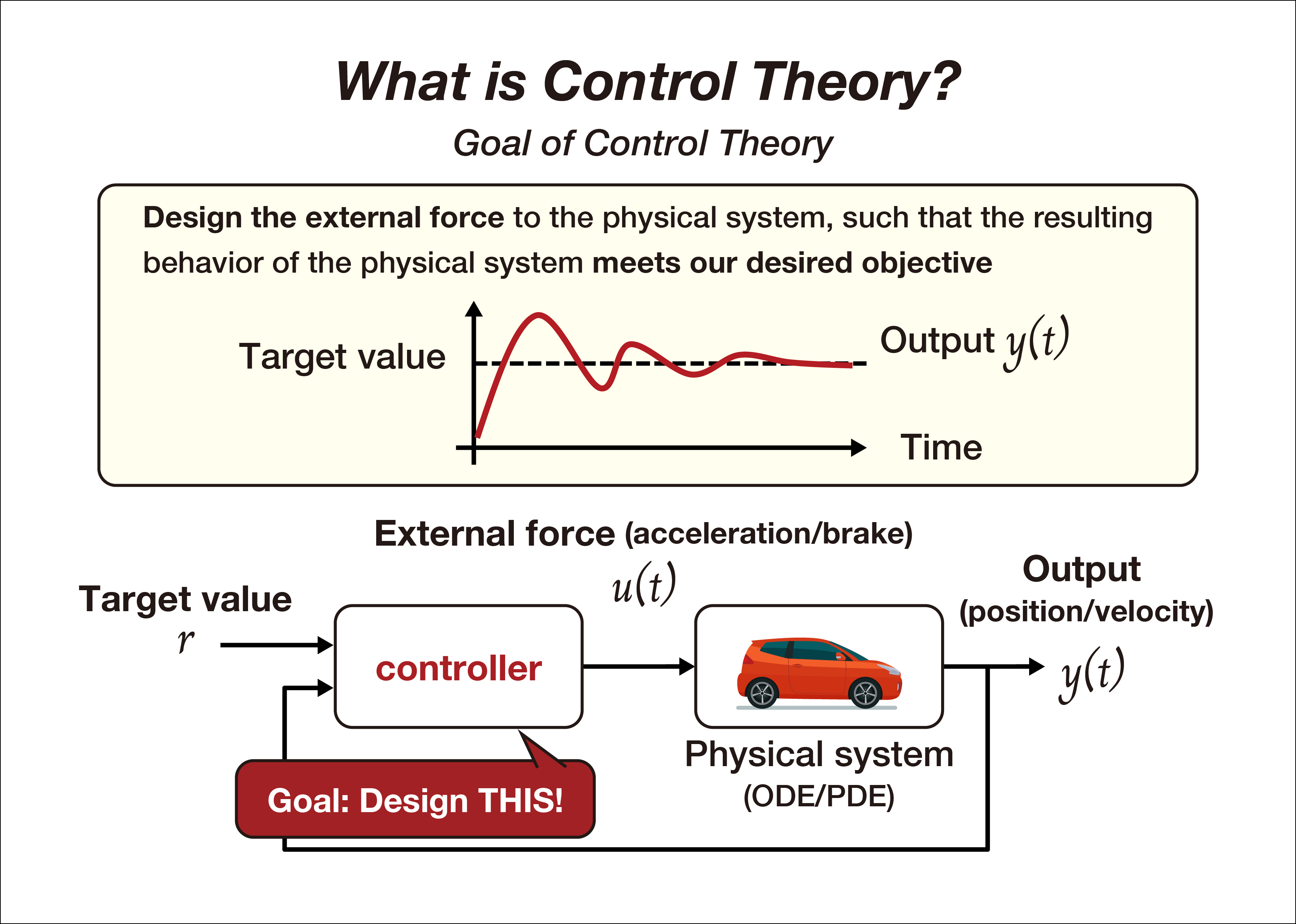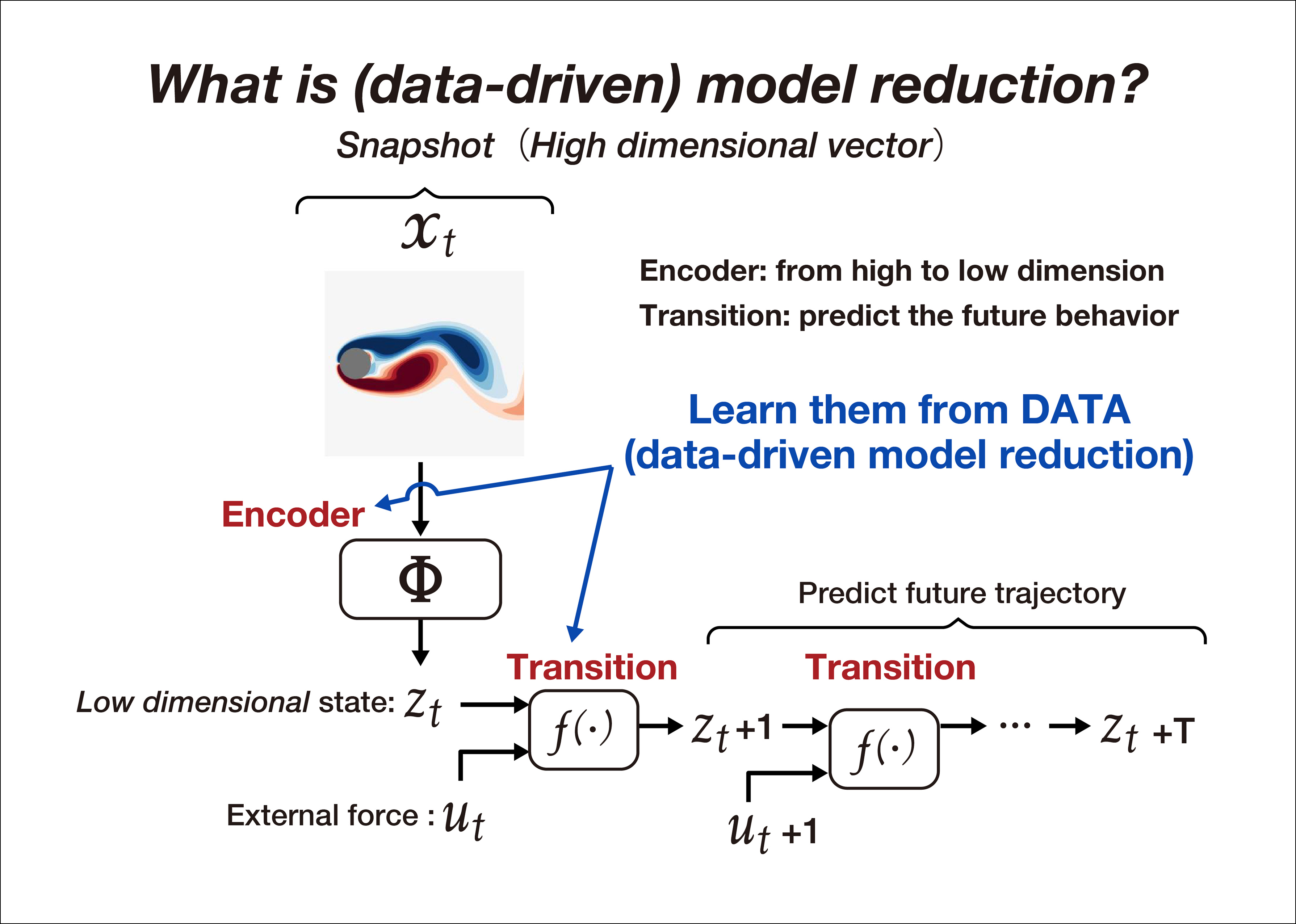Projects
Topic 2: Data-driven meteorological controller
橋本 和宗/Hashimoto Kazumune
Lecturer, Department of Electrical, Electronic and Information Engineering, Graduate School of Engineering, Osaka University
Interview
Q1: Please tell us about the area of your study.
I study system control theory.
It is a mathematical framework for autonomously controlling various objects such as cars, robots, and drones. For example, the simplest system control theory goal is to control a drone to a desired destination or a robot arm to a certain desired angle.
A more practical example is the automated driving of cars and aircraft. In automated driving, various sensors such as GPS and Lidar are used to collect information about the surrounding environment, and the driver uses this information to control the steering wheel and accelerator. The main goal of system control theory is to construct a "brain" that plays such a decision-making role.
A more practical example is the automated driving of cars and aircraft. In automated driving, various sensors such as GPS and Lidar are used to collect information about the surrounding environment, and the driver uses this information to control the steering wheel and accelerator. The main goal of system control theory is to construct a "brain" that plays such a decision-making role.

To construct such a "brain," systems control theory utilizes what is called a mathematical model. This is a differential equation that describes how the physical quantity under consideration (e.g., the robot's position or the car's speed) changes over time. It may be a little difficult to understand, but it becomes easier to grasp if you consider the equation of motion (F=ma) learned in high school physics as an example. The equation of motion can be called a mathematical model, because it mathematically describes how physical quantities such as position, velocity, and acceleration change in response to a force applied from the outside.
System control theory is to mathematically analyze such differential equations and to consider what kind of external forces should be applied to the object to be controlled to obtain the most desirable behavior.
System control theory is to mathematically analyze such differential equations and to consider what kind of external forces should be applied to the object to be controlled to obtain the most desirable behavior.
Q2: What do you find interesting about system control theory?
The interesting part of system control theory to me is its high versatileness.
For example, certain methods investigated in system control theory can be applied to both robots and drones. I think the most attractive point is that the same method can be applied to various objects in this way. Students who have studied system control theory are actively working in a variety of fields, such as space, automotive, and robotics industries.
Control engineering itself has a long history, starting around the time of the Industrial Revolution and used in steam locomotives. Theories that were thought up 7~80 years ago, when computers were not as advanced as they are today, are sometimes dug up and brought into the limelight in the modern age. Trends change as time goes by, and theories that did not attract much attention in the past may attract attention now, so it is important to read not only recent papers but also old ones. There is also a possibility that the control theory we are working on now will attract attention in the future. I think this point is also profound and interesting.
Control engineering itself has a long history, starting around the time of the Industrial Revolution and used in steam locomotives. Theories that were thought up 7~80 years ago, when computers were not as advanced as they are today, are sometimes dug up and brought into the limelight in the modern age. Trends change as time goes by, and theories that did not attract much attention in the past may attract attention now, so it is important to read not only recent papers but also old ones. There is also a possibility that the control theory we are working on now will attract attention in the future. I think this point is also profound and interesting.
Q3: Tell us about the research project you are working on.
I am examining the applicability of various theories and methods considered in system control theory to controlling weather.
In the Moonshot Goal 8 project, one of the main goals is to control the weather by applying some kind of external forces to typhoons and heavy rain to change their trajectory or weaken their intensity. This goal is exactly in line with the goal of system control theory, which is to apply an appropriate external force to the object to be controlled in order to obtain the desired behavior.
I am examining the applicability of various theories and methods considered in system control theory to controlling weather. By applying system control theory, it becomes mathematically clear, for example, what kind of external forces and how much to apply to a weather event such as a typhoon in order to efficiently reduce its intensity.
I am examining the applicability of various theories and methods considered in system control theory to controlling weather. By applying system control theory, it becomes mathematically clear, for example, what kind of external forces and how much to apply to a weather event such as a typhoon in order to efficiently reduce its intensity.
Q4. What are the barriers to research at this point?
Mathematical models of weather are extremely complex and have a huge number of states, so the direct application of conventional system control theory is computationally expensive.
Consequently, we assume that it is difficult to directly apply existing methods to controlling weather.
Therefore, in this research project, we are considering model simplification to reduce the sizes of physical systems. This is done by approximating a differential equation with a large number of variables by a differential equation consisting of only a small number of variables. By applying methods of system control theory to the obtained low-dimensional differential equation and analyzing it, the computational cost required for the design of the "brain" that plays the role of decision-making can be reduced.
Therefore, in this research project, we are considering model simplification to reduce the sizes of physical systems. This is done by approximating a differential equation with a large number of variables by a differential equation consisting of only a small number of variables. By applying methods of system control theory to the obtained low-dimensional differential equation and analyzing it, the computational cost required for the design of the "brain" that plays the role of decision-making can be reduced.

On the other hand, simply reducing the number of variables through dimensionality reduction is not sufficient, we also need a consistent simplification to preserve the characteristic behavior of the original high-dimensional system to some extent. This is the biggest challenge. We need to consider what kind of dimensionality reduction approach can be used for weather, which has not been considered by system control theory until now. In addition, we also need to examine how much error to tolerate before reducing the dimensionality.
Q5. Tell us your motivation to join this project targeting weather control as a principal investigator.
I can think about things from the perspective of another field of expertise, system control theory, and I believe that I can offer new ideas that are not bound by stereotypes about weather.
I am not a meteorologist, but I think that is a good thing on the contrary. I can think about things from the perspective of another field of expertise, system control theory, and I believe that I can offer new ideas that are not bound by stereotypes about weather. First of all, I would like to tackle issues with a certain degree of awareness of the subject of weather, but without being overly fixated on it, and with a free mindset.
Also, I am probably the only person specializing in the field of system control theory who tries to control natural phenomena, such as weather. This is very challenging, and if I can obtain research results showing that weather can be controlled using system control theory, I believe it will have a great impact on systems control theory.
Also, I am probably the only person specializing in the field of system control theory who tries to control natural phenomena, such as weather. This is very challenging, and if I can obtain research results showing that weather can be controlled using system control theory, I believe it will have a great impact on systems control theory.
Q6: What kind of world do you think will exist in 2050, the target year of the moonshot?
I also expect that each household will have a robot to help with housework and childcare, making our society more affluent than it is today.
I specialize in system control theory, so I would like to talk from that perspective. 2050 will be a world in which everything, including automobiles and robots, will be connected to the Internet and automated. I also expect that each household will have a robot to help with housework and childcare, making our society more affluent than it is today.Recently, the safety of automated driving has become an issue, but technologies to solve this problem are gradually being developed, and I believe that such safety-related technologies will be systematized by 2050.
At first glance, these safety technologies may seem unrelated to weather control, but I believe they are greatly connected. For example, if control techniques that guarantee safety are systematized, we may be able to control, for example, typhoons that can cause major disasters by using these theories. From this perspective, I believe that we can realize a safer and more secure society in 2050, with fewer traffic accidents and disasters than at present.



